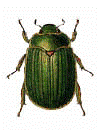Museum, University of Nebraska State
Document Type
Article
Date of this Version
January 2002
Abstract
The superfamily Scarabaeoidea is a large, diverse, cosmopolitan group of beetles. Scarabaeoids are adapted to most habitats, and they are fungivores, herbivores, necrophages, coprophages, saprophages, and some are carnivores. They are widely distributed, even living in the Arctic in animal burrows. Some scarabs exhibit parental care and sociality. Some are myrmecophilous, termitophilous, or ectoparasitic. Many possess extravagant horns, others are able to roll into a compact ball, and still others are highly armored for inquiline life. Some are agricultural pests that may destroy crops while others are used in the biological control of dung and dung flies. Scarabaeoids are popular beetles due to their large size, bright colors, and interesting natural histories. Early Egyptians revered the scarab as a god, Jean Henri Fabre studied their behavior, and Charles Darwin used observations of scarabs in his theory of sexual selection.



Comments
Published in American Beetles, Volume 2: Polyphaga: Scarabaeoidea through Curculionoidea, edited by Ross Arnett, Jr., Michael C. Th omas, Paul E. Skelley, and J. Howard Frank. Boca Raton: CRC Press, 2002. Copyright © 2002 CRC Press LLC, a division of Taylor & Francis Group. Used by permission.